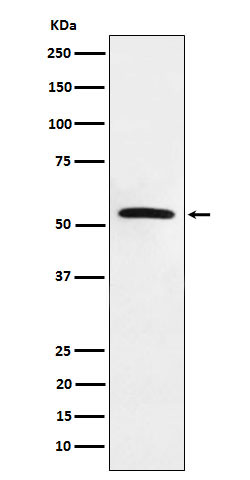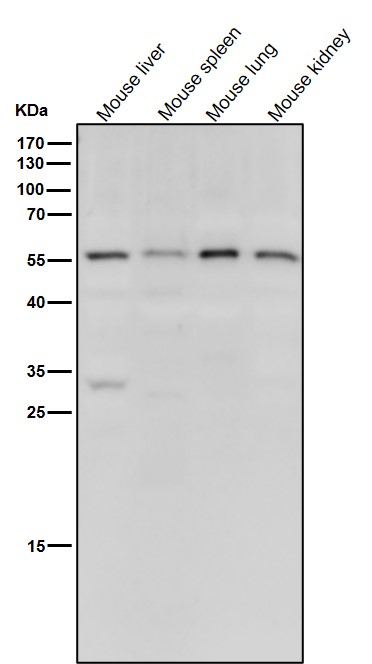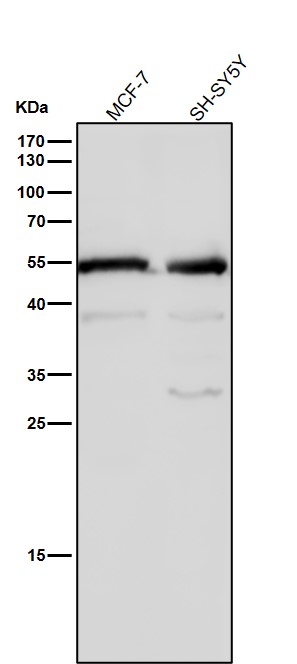


| WB | 咨询技术 | Human,Mouse,Rat |
| IF | 1/20-1/50 | Human,Mouse,Rat |
| IHC | 咨询技术 | Human,Mouse,Rat |
| ICC | 技术咨询 | Human,Mouse,Rat |
| FCM | 咨询技术 | Human,Mouse,Rat |
| Elisa | 咨询技术 | Human,Mouse,Rat |
| Aliases | hMLKL; Mixed lineage kinase domain like; Mlkl;;MLKL |
| WB Predicted band size | 54 kDa |
| Host/Isotype | Rabbit IgG |
| Antibody Type | Primary antibody |
| Storage | Store at 4°C short term. Aliquot and store at -20°C long term. Avoid freeze/thaw cycles. |
| Species Reactivity | Human,Mouse,Rat |
| Immunogen | A synthesized peptide derived from human MLKL |
| Formulation | Purified antibody in PBS with 0.05% sodium azide,0.05% BSA and 50% glycerol. |
+ +
以下是3篇关于MLKL抗体的代表性文献及其摘要概括:
---
1. **文献名称**:*MLKL compromises plasma membrane integrity by binding to phosphatidylinositol phosphates*
**作者**:Dondelinger, Y. et al.
**摘要**:该研究通过免疫沉淀和免疫荧光技术,利用MLKL特异性抗体揭示MLKL在坏死性凋亡中破坏细胞膜完整性的机制,证明其通过结合磷脂肌醇磷酸导致膜透化。
---
2. **文献名称**:*A plug release mechanism for membrane permeation by MLKL*
**作者**:Su, L. et al.
**摘要**:作者使用针对MLKL的磷酸化特异性抗体(如抗p-S345抗体),结合冷冻电镜技术,解析了MLKL激活后插入细胞膜的分子机制,提出“塞子释放”模型解释其膜穿孔功能。
---
3. **文献名称**:*RIPK3-MLKL-mediated necroinflammation contributes to AKI progression to CKD*
**作者**:Zhu, Y. et al.
**摘要**:研究通过Western blot和免疫组化(使用MLKL抗体)证实肾损伤中MLKL的激活,并证明抑制MLKL可减轻坏死性炎症反应,阻断急性肾损伤向慢性肾病发展。
---
如需扩展,可补充以下文献:
4. **文献名称**:*Distinct roles of RIP1-RIP3 hetero- and RIP3-RIP3 homo-interaction in mediating necroptosis*
**作者**:Chen, W. et al.
**摘要**:利用MLKL基因敲除模型及MLKL抗体,阐明RIP3同源/异源寡聚化在坏死性凋亡中的不同作用,强调MLKL是下游必需执行分子。
---
这些文献涵盖了MLKL抗体的关键技术应用(如检测激活状态、定位及机制研究),并关联了疾病模型中的功能验证。
MLKL (Mixed Lineage Kinase Domain-Like) antibodies are essential tools for studying necroptosis, a form of regulated cell death distinct from apoptosis. MLKL is a key effector protein in the necroptosis pathway, activated via phosphorylation by RIPK3 (Receptor-Interacting Protein Kinase 3) upon death receptor or TLR signaling. This phosphorylation triggers MLKL oligomerization and translocation to the plasma membrane, disrupting membrane integrity and causing cell death. Structurally, MLKL contains an N-terminal four-helix bundle domain critical for membrane permeabilization and a C-terminal pseudokinase domain regulating its activation.
MLKL antibodies are widely used to detect MLKL expression, phosphorylation status (e.g., at Ser358 or Thr357/Ser358 in humans), or conformational changes during necroptosis. They enable researchers to validate MLKL's role in disease models, including neurodegenerative disorders, inflammatory conditions, and cancer, where necroptosis contributes to pathogenesis or therapy resistance. Common applications include Western blotting, immunohistochemistry, and immunofluorescence. Specific antibodies, such as phospho-specific clones, help distinguish active MLKL from its inactive form, offering insights into pathway activation in tissues or cultured cells. However, antibody specificity remains a consideration, requiring careful validation via knockout controls or alternative detection methods. Recent studies also explore MLKL's non-necroptotic roles, such as inflammasome regulation, expanding the utility of these antibodies in diverse research contexts.
×